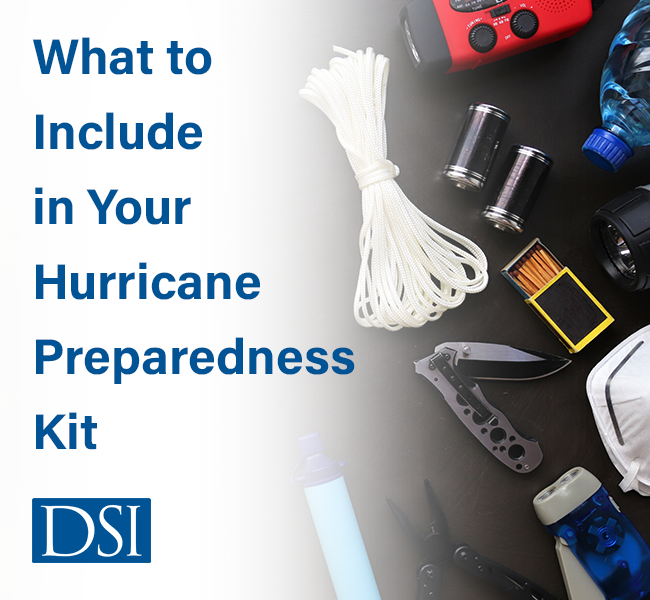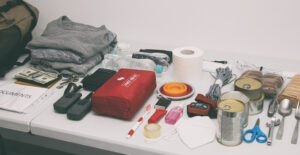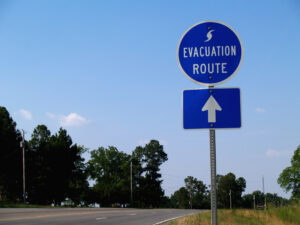When you live in Florida it can seem like every season is hurricane season. For Floridians the season begins June 1st and ends on November 30th of each year. For 6 months out of the year we are on high alert!
The best time to prepare for a hurricane is before storm season begins. This ensures that you have access to adequate supplies and are ready if the storm blows our way.
At Darr Schackow Insurance we always recommend having a hurricane kit prepped and ready so that you stay ahead of the hustle and bustle of an impending hurricane. Read on for some more hurricane tips and what you should pack in your hurricane kit.
What is a Hurricane Kit?
A hurricane kit is a collection of items that you and your family may need in the event of a hurricane. The idea behind a hurricane kit is to have essentials on hand that will allow you to survive without electricity, clean water, and other basics that we typically have access to. ‘
You can put your items in a large bag, box, or whatever suits your needs.
Essential Items for Your Hurricane Kit
Everyone’s hurricane kit will look different and you will tailor it to your family’s specific needs, but each kit should have the basics. When preparing your hurricane kit, include the following essentials:
- Water: You’ll need one gallon of water per person per day for at least 3 days. You can use it for drinking, washing hands, or a quick wash up.
- Food: Pack enough nonperishable food for a minimum of 3 days. These can be canned goods or goods you can cook over a fire if you know how to build one. Another option is bread, peanut butter, and jelly packets.
- Battery-Powered Radio: This helps you keep up to date with weather and emergency announcements.
- Batteries: You may need extras for your flashlights and radio.
- First Aid Kit: There’s no telling what will happen so being prepared with bandaids, antiseptics, and other necessary supplies is important.
- Medication: Pack at least a week’s worth of medication.
- Personal Documents: Gather copies of insurance policies, birth certificates, the deed to your home, passports, and social security cards. Place them in a waterproof folder of some sort.
- Contact List: Keep a list of important phone numbers you may need. This includes family, friends, doctors, hospitals, your city or county, and insurance policy numbers.
- Cash: ATMs and banks may not be open or operational so make sure you have extra cash on hand.
- Toys and Activities: If you have children in your household, toys and activities are important to keep them occupied and focused on something other than the storm.
- Baby Supplies: Remember that you’ll need diapers, wipes, and formula for at least 3 days.
How to Prepare for a Hurricane
You’ve heard there’s a hurricane headed your way so what do you do? First thing is to not panic. The second thing is to make sure you’re prepared.
Preparing for a hurricane involves more than just your handy hurricane kit; it requires proactive planning and staying informed throughout the season. Here’s how to ensure you’re ready:
- Plan Ahead: Create a hurricane preparedness plan with your family or friends. If you have to evacuate make sure that everyone knows where they are going and that everyone has their essentials
- Assemble Your Kit: Have your hurricane kit ready to go at all times.
- Monitor Weather Reports: Stay informed and up to date on storms by following relatable sources like the NOAA National Hurricane Center or local news.
- Fuel: Fuel can become a scarce resource in the event that a named storm is approaching. Fill up long before you have to and top it off when you need to.
- Outside: Bring in anything that may blow away. Not only will you lose your items but they can become a projectile and harm yours or other’s property.
Resources for Tracking Storms
During storm season it’s important to stay up to date on the weather in your area. If you see a named storm forming, don’t panic. It doesn’t mean that it will definitely make landfall in your area. The best thing to do is be prepared and keep a watchful eye. The best resources are:
- NOAA National Hurricane Center: They offer real-time updates and predictions on the path of the storm.
- Local News: Nobody knows your area better than your local weather station. They will offer everything you need to know on the storm’s trajectory.
Weather Apps: Utilize the Weather Channel or AccuWeather for updates on the go if your phone is working during the storm.
Evacuation Planning: Stay Calm and Informed
Florida is surrounded by water on 3 sides and if you live inland you may think you don’t need an evacuation plan, but that couldn’t be further from the truth. Knowing evacuation routes and having a clear plan is crucial to you and your family’s safety.
If you don’t have a plan in place and happen to be evacuated, you may panic and that’s the worst thing you can do. Begin by familiarizing yourself with local government websites, online resources, and local news where they will provide detailed routes and instructions for evacuation. Regularly check these resources for any changes.
During an evacuation stay calm and follow the plan you’ve set. Don’t panic if local law enforcement changes your route or destination. Listening to them is incredibly important because they know the city and circumstances much better than you do.
Hurricanes Can Be Scary but Not Being Prepared Is Even Scarier
At Darr Schackow we know hurricanes can create fear and uncertainty for you and your family but being prepared significantly reduces stress and ensures your family’s safety. By assembling a hurricane kit that is tailored to your family, having adequate insurance, and staying informed you can face hurricane season with confidence.
If you’re unsure about the details of your current hurricane policy or deductibles, contact us. We are happy to go over your coverage to make sure you’re adequately protected.



